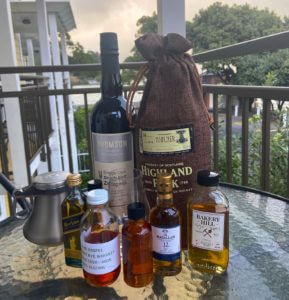A SOLITARY DRAM OF WHISKY
THE MILLENNIAL BUG
‘It’s all about contacts,’ I’d said to my daughter recently. Knowing people who know people. Qualifications are great, but personal contacts are ultimately as useful – sometimes more.
I look about Christchurch Town Hall at the people I know, value, love; the ones I’ve just met and how they and their friends are now interacting with a new crowd and the folks behind the stands. At a great whisky show such as DramFest the barriers dissolve.
The contacts are not just personal, but liquid which itself provides new pathways of exploration: of style, place, or philosophy.
If everything is at some level connected, this is a lesson on how class, ethnicity, sex, education can fall away. All opinions are welcome and valid, discussions encouraged. So we chatted about the links between rum and whisky, of Speyside’s varied facets, Scotch’s position within a new world of drinks, and how to learn from the past.
Whisky’s growth has come through community. ‘Liquid to lips,’ said Glenmorangie’s Brendan McCarron to me as we watched the folk streaming in, ‘that’s the most important thing.’ Weill that have to change now that people are wary of interaction thanks to Covid-19/ This was brought into relevance when I was told to self-isolate after someone had tested positive for the virus at a screening of The Amber Light (an event which, ironically, was sponsored by Fever-Tree). Thankfully I’ve had a nice place to sit out the hermetic existence (I’m symptom free, by the way).
I’m lucky. This isn’t that far removed from my normal existence – sitting, reading, and writing in a room full of booze. The email is working (in fact, being 13 hours ahead of the UK and between 17 and 20 of the US has distinct advantages). Some people complain that Zoom and Skype are not working fully, but I never turn the camera on anyway. I have a hefty selection of whisky. OK, the views been exhausted and I’m becoming increasingly concerned about the limping seagull on the foreshore, but still…

If this is becoming the norm, then what does this mean to Féis Ìle, Whisky Fringe and the Speyside Festival’ how will it affect whisky clubs and visitors centres – Glenfiddich’s has just been closed and more will probably follow. What of all the training courses, the meal-oriented model for whisky education in China, the impact on bars and stores? What of Scotland’s heavy reliance on tourism? At what stage do you start looking at everyone with a degree of trepidation? We are becoming wary of human interaction. What starts with avoiding the hug, then becomes the handshake, eventually eye contact.
We are already part way there, clicking for entertainment, communication, and interaction. Amazon will drop off the books, supermarkets will deliver, Deliveroo called up when we’re bored of cooking, your friendly off-licence will drop off a bottle of something when summoned. Who needs the pub these days? We are quarantined already. Fuck!I’m becoming a millennial!
What though of the zero-hours workers delivering our meals, or the folk without sick pay? What of the tour guides and shop staff, and bartenders? Not being able to go to a whisky show is trivial, compared to that financial reality. Covid-19 emphasises and accelerates the societal shift which is already underway. It thickens the skin of the bubble.
At a time when connection are more important than ever, when whisky in its own small ways shows the benefits and possibilities of community, that vital contact is sundered. How do we interact if we are told (rightly) to distance ourselves? Our behaviour has to change – for how long it is unclear, but things won’t suddenly click back. In some way, this will be the norm.
So we wait for the vaccine, we wash our hands, ingest medicinal amounts of spirits. Covid-19 will rise, it will peak, but it will not disappear. What will the community look like when we all re-emerge from our isolation? Do we stay in the bubble, or try harder to re-establish human contact?